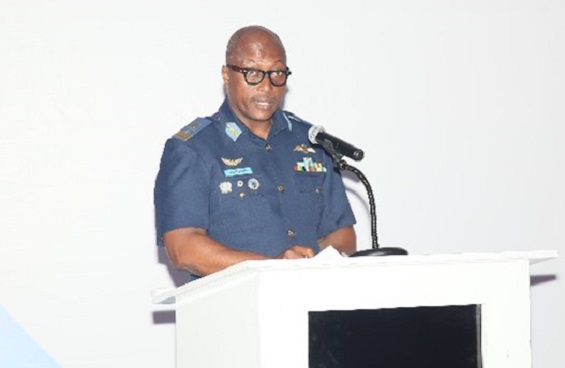Air Cdre David Anetey Akrong
Deputy Commandant of the Kofi Annan International Peacekeeping Training Centre (KAIPTC), Air Cdre David Anetey Akrong, has urged coastal nations and maritime bodies within the Gulf of Guinea region to enhance their collaborative efforts in combating organised crimes and illicit activities at sea.
The Gulf of Guinea region, he said, remains a focal point for transnational organised crime, particularly maritime piracy, alongside other threats to maritime security such as armed robbery against ships at sea, illicit oil bunkering, kidnapping for ransom, and trafficking of people and narcotics.
These criminal activities thrive due to weaknesses in key institutions responsible for addressing them, he went on.
Air Cdre David Akrong noted that despite the reduction in maritime piracy incidents in recent years, concerns have been raised about their resurgence as indicated in the International Maritime Bureau 2020 report.
“There is a need therefore for the Gulf of Guinea regional authorities, and the international community to refocus their attention on the region. Long-term sustainable solutions that effectively address this crime should be established,” he stated.
Air Commodore Akrong said that the combined efforts of coastal nations and maritime-related bodies are essential in successfully combating organised crime, including drug trafficking, smuggling small arms and light weapons, illicit fishing, human trafficking, illegal bunkering, piracy, and other criminal activities.
These remarks were made during the opening ceremony of a two-week Maritime Security and Transnational Organised Crime course which commenced on April 15, 2024.
Ms. Pauline Okkens, Political Advisor of the German Embassy in Ghana, reiterated the German government’s support for the course and emphasised the need to empower military personnel, police officers, civilians, and women by investing in knowledge and skills to effectively combat transnational crimes.
“Let’s continue to empower the military, police, civilians, and women, investing in knowledge and skills to combat transnational crimes effectively,” she said.
The training programme involved 25 participants, comprising 17 Ghanaians from various security agencies and organisations such as the Ghana Armed Forces, Police, Ghana Immigration Service, Prison Service, Customs Division of the GRA, Ghana Ports and Harbours Authority, Fisheries Commission, Narcotic Control Board, National Boundary Commission, Volta Lake Transport, and the media.
There were also eight participants from sister countries within the West African sub-region.
By Prince Fiifi Yorke


